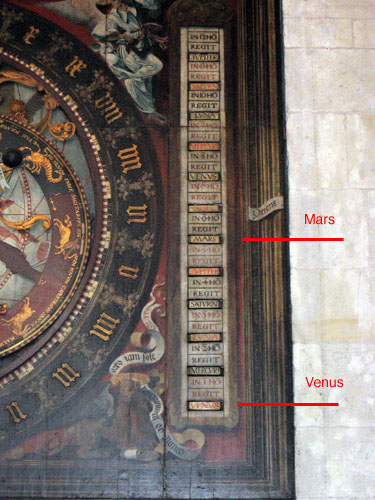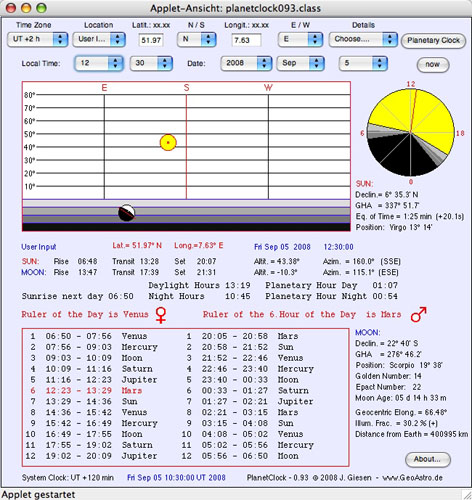|
|
GeoAstro Applets |
Astronomy |
Chaos Game |
Java |
Miscel- laneous |
Planet Clock Applet
Planetary (Unequal)
Hours Calculator
|
|
Check your time zone offset and the local time. |
|
|
Click the applet first! |
|
|
You may use the keys "y", "m", "d", "h", "n" to increase the year, month, date, hour, minute, or Shift key and "y", "m", "d", "h", "n" to decrease the year, month, date, hour, minute ! |
Press
the
button "Planetary Clock":

Applet: Quadrans Vetus
| The planetary hours (also called unequal
hours, Jewish hours, Italian hours) are an ancient
system in which one of the seven traditional naked eye
planets is given rulership over each day and various
parts of the day. Monday is always the Day of the
Moon. Tuesday is the day of Mars, Wednesday is ruled
by Mercury, Thursday is Jupiter's day, Friday is the
day of Venus, Saturday is the day of Saturn, and
Sunday is the day of the Sun. Each planetary day begins at sunrise, and ends at the next day's sunrise. For example, Sunrise on Saturday is the beginning of the day of Saturn. Before sunrise on Saturday, you are still under the day of Venus. The day is divided into two parts; the day (time between sunrise and sunset) and the night (time between sunset and tomorrow's sunrise). Each part of the day is then divided into 12 equal parts, for a total of 24 (unequal) hours.The further the location is from the equator; and the closer the date is to the solstices (as opposed to the equinoxes); the greater the difference in length between the length of the planetary hours and the clock hours. The first planetary hour of the day is always the same as the planetary day; so sunrise on Monday is the beginning of both the day of the Moon and the hour of the Moon. The hours repeat infinitely in this order: Saturn, Jupiter,
Mars, Sun, Venus, Mercury, Moon
So the second planetary hour of the day of
the Moon is the hour of Saturn, the third would be the
hour of Jupiter, and so on.(from: http://en.wikipedia.org/wiki/Planetary_hours) Example: Berlin, 52.51° N, 13.41° E:
The Canonical Daytime Hours:
|
The
Astronomical
Clock in Münster
Münster, 51.97° N, 7.63° E
Fr, 2008 September 5

at 12:30 local time (CEST):
6 th hour of the day
ruler of the hour is Mars
ruler of the 1 st hour,
and ruler of the day, is Venus


|
|
|
The Uses of History in Science Education
|
Last Modified: 2023, Oct 06
© 2008-2023 Juergen Giesen
![]()